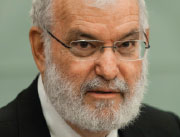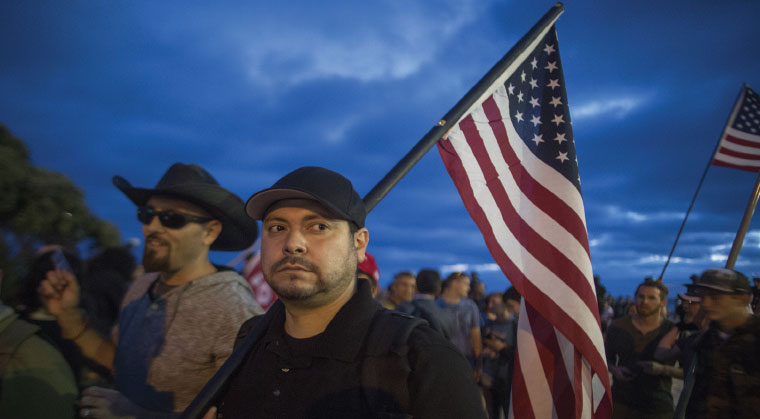Syria Turns Treacherous for Israel


BUSINESS OVERHEAD Israel painstakingly maintained a calculated neutrality in the Syrian civil war. The IDF attacked as many as 200 Iranian weapons convoys headed for Hezbollah over the years but Iran never retaliated apparently viewing the Israeli strikes and their resultant losses of men and matériel as the “cost of doing business” for what they have now won — the ability to set up a military shop on the ruins of Syria Photo: FLASH90
I t would be an exaggeration to say that the honeymoon is over between the Netanyahu government and the Trump administration. But Israel’s objections to certain conditions in the Syrian cease-fire is the equivalent of a newlyweds’ first big fight.
Both sides hope the differences are reconcilable but Israel clearly has more to lose.
Late last week an Israeli delegation led by Mossad head Yossi Cohen and Major-General Hertzi Halevi chief of the IDF’s Military Intelligence Directorate met with US National Security Advisor H.R. McMaster his deputy Dina Powell and Jason Greenblatt the president’s special representative for international negotiations.
In Israel’s view the Trump administration has marched to Russian president Vladimir Putin’s tune agreeing to a cease-fire that allows Iranian forces to remain in range of the Golan Heights. In recent meetings between the sides held in Jordan and Europe Israel presented the US and Russia with its reservations about the agreement under which a too-narrow-for-comfort 20-kilometer (12-mile) buffer zone would be drawn along the Syrian-Jordan-Israeli borders. Israel has demanded from Washington and Moscow that any final agreement should require a complete withdrawal of Iranian forces — and Hezbollah and Shiite militias — from all of Syria. Israeli officials sense that the Americans satisfied that they have beaten back ISIS in Syria want to take their ball and go home — and are willing to let Russia call the shots.
Israel is also trying to convince the US that a permanent presence of hostile Shiite forces in Syria can dangerously alter the demographic reality in the region disrupting Trump’s goal of assembling a Sunni coalition that would either make peace with Israel or see the Jewish state as a strategic partner.
At press time Prime Minister Netanyahu was headed for the Black Sea resort of Sochi to meet with Russian president Vladimir Putin for further discussions.
Mossad head Yossi Cohen warned Netanyahu’s cabinet before he left for the US: “The region is changing to our detriment.” Cohen concluded that the nuclear agreement Iran signed with President Obama’s White House and other Western powers in 2015 has emboldened Iran militarily and added tens of billions of dollars to its economy. Moreover despite the agreement Iran remains a “threshold” nuclear state.

Yaakov Amidror: “Israel will not allow Iran and Hezbollah to exploit their victory in the long war in Syria to focus on Israel”
Cohen also expressed concerns over the indirect contribution by the Western coalition toward Iranian hegemony in the Middle East. The obsessive focus of Western states on defeating ISIS paved the way for a flow of pro-Iranian Shiite militias into the Iraqi and Syrian arenas. As a result for the first time since the Syrian Civil War began in 2011 Israel faces the threat of a spread of hostile forces led by Hezbollah on a long strip of land parallel to Israel’s northern border stretching from Rosh Hanikra in the west to the intersection where Syria Israel and Jordan share a border in the southeast of the Golan Heights.
Iran’s presence in Syria already includes ground bases thousands of fighters from various Shiite militias and advanced plans to establish an air base and seaport along the Mediterranean a goal Iran has eyed since the days of the Persian Empire.
Israel’s objection to the cease-fire deal goes beyond the proposed 20-kilometer buffer zone. Jerusalem also fears that Russian units overseeing the implementation of the agreement will do little to prevent Iranian forces from encroaching further.
Yaakov Amidror Netanyahu’s former national security advisor in a message aimed at the United States Russia and Iran told the foreign media last week that Israel must prevent the spread of this menace at all costs and that it will not stand by as Iran builds military infrastructure inside Syria.
“Israel will not allow Iran and Hezbollah to exploit their victory in the long war in Syria to focus on Israel ” Amidror said. “That is Israel’s [strategic] interest and we will strive to make sure our interests are preserved.”
Israel painstakingly maintained a calculated neutrality in the Syrian Civil War. The IDF attacked as many as 200 Iranian weapons convoys headed for Hezbollah over the years but Iran never retaliated apparently viewing the Israeli strikes and their resultant losses of men and matériel as the “cost of doing business” for what they have now won — the ability to set up a military shop on the ruins of Syria.
A careful look at what is unfolding in Syria shows that Russia is the big winner in the seven-year-old civil war. Russia reestablished itself as a military power with global reach quashing the uprising against Bashar al-Assad. But the Russians would not have achieved their gains without Iran. Russia’s air force provided cover but Iran and its allied militias did the dirty work of the war on the ground.
The troubling picture is rounded out by President Trump’s decision last month to suspend financial aid to Syrian rebels previously on the payroll of the CIA.
It is in this context that the Israeli delegation headed to Washington last week. After the meeting Jason Greenblatt tweeted that the two sides “had a very productive discussion on our strong and continuing partnership.”
However as is always the case in international relations countries have no friends only interests. The US wants out of military involvements in the region and understandably so. Russia and Iran are getting what they want through brute force.
The question for Israel is more nuanced. How do they keep Iran and Hezbollah at more than an arm’s length without a military confrontation or crossing the US and Russia?
If the answer proves to be that neither goal is achievable then the end of the Syrian Civil War could prove to be something far more dangerous — for Israel and the Middle East. (Originally featured in Mishpacha Issue 674)
Oops! We could not locate your form.













